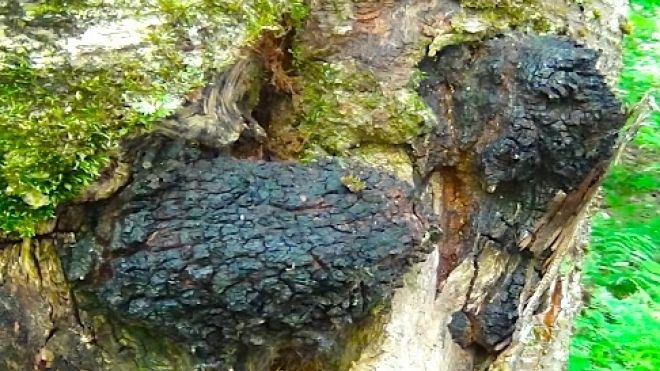Chaga: A potent immune enhancing fungus
Recently my wife and I were walking in the woods when I spotted a rotting birch tree. All over the decaying trunk were clusters of a gnarly black growth, which I quickly recognized as chaga (Inonotus obliquus).  Relatively unused in the west, chaga is a potent immune enhancing agent that is highly popular in Russia and parts of Europe, and it enjoys a major body of science for its health benefits. Unlike most fungus, chaga is hard and woody, bearing no resemblance to mushrooms. Instead, it looks more like a cracked piece of burned charcoal. Chaga’s black color is due to a concentration of melanin, the same pigment that colors human skin. Because chaga can be used to start fires, it is also known as the “tinder fungus.” The name chaga derives from the Komi-Permyak language of Russia’s Kama River Basin, where the fungus has played a role in traditional medicine for centuries. Chaga can be found throughout northern Asia and in Canada, Norway, northern and eastern Europe and northern parts of the United Sates. Chaga is rich in natural antioxidant and anti-inflammatory phenols, containing the compounds betulin and betulinic acid – which derive directly from host birch trees. Both betulin and betulinic acid demonstrate anti-tumor effects, which explain why chaga is known as an anti-cancer agent. Additionally, some science shows that betulin can play a beneficial role in controlling metabolic disorders, such as obesity and metabolic syndrome. A group of compounds in chaga called lanostanoids also appear to play significant anti-cancer roles. The exact anti-cancer activity of chaga is not completely understood, but some compounds in the fungus boost immune activity, some specifically prevent cancer cells from replicating, and others cause premature cancer cell death. This argues for the utilization of a whole chaga extract, rather than isolating a single compound. In chaga, many agents appear to be active against cancer. One of the most surprising benefits of chaga is in regards to psoriasis. In one Russian study, psoriasis patients who took chaga recovered from their condition. Given that psoriasis is notoriously difficult to treat and responds to very little therpaies, this effect alone could be of enormous benefit to many. The compound ergosterol in chaga, along with related agents, shows anti-inflammatory activity. This may account for why chaga is thought of as a life-extending agent in China, as inflammation is part of every chronic, degenerative disease. Reducing systemic inflammation can mitigate or help prevent a variety of health problems, leading to a healthier life – and presumably a longer one. Traditionally, chaga has been used for a variety of purposes. Scientific investigation chaga’s use as an anti-allergy agent shows that in animals, the fungus has the ability to prevent anaphylactic shock – a serious and potentially fatal consequence of a severe allergy. In another study, administration of an extract of chaga reduced infection due to the Herpes simplex virus. In a cell study, chaga showed potent activity against the hepatitis C virus. Whether this same activity will prove true in living humans remains to be seen, but if it does, then chaga will benefit thousands of people who often suffer for many years with this crippling disease. Chaga products are widely available in natural food stores and on the Internet. One chaga product I like is made in Vermont and is available at www.Mariefrohlich.com. Considering that spring is here and chaga demonstrates value against allergies, this may be an excellent time to try chaga, whose nickname “Mushroom of Immortality” appears to be far more than just a clever slogan.Chris Kilham is a medicine hunter who researches natural remedies all over the world, from the Amazon to Siberia. He teaches ethnobotany at the University of Massachusetts Amherst, where he is Explorer In Residence. Chris advises herbal, cosmetic and pharmaceutical companies and is a regular guest on radio and TV programs worldwide. His field research is largely sponsored by Naturex of Avignon, France. Read more at& MedicineHunter.com.source : http://www.foxnews.com/health/2013/05/29/chaga-potent-immune-enhancing-fungus/


